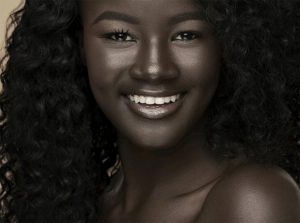 The modeling industry is no stranger to the idea of discrimination and prejudice. They often discriminate against women of different shapes, heights, and color. Model Khoudia Diop is also no stranger to prejudice herself. Discrimination is the unfair or unjust treatment of people based on different groups such as race, sex, and age (Myers, 2012). While prejudice is, the favorable or unfavorable feeling towards people based off a preconceived opinion (Myers, 2012).
The modeling industry is no stranger to the idea of discrimination and prejudice. They often discriminate against women of different shapes, heights, and color. Model Khoudia Diop is also no stranger to prejudice herself. Discrimination is the unfair or unjust treatment of people based on different groups such as race, sex, and age (Myers, 2012). While prejudice is, the favorable or unfavorable feeling towards people based off a preconceived opinion (Myers, 2012).
Often referred to as “melanin goddess” Khoudia Diop has been experiencing prejudice from as young as a little girl. Due to her deep rich toned skin, she recalls when children often called her names and poked fun at her. They called her names such as ‘midnight’ or ‘mother of stars’ she said. Khoudia has learned to not listen to the negative comments and embrace not only her inner but outer beauty as well. At first, she would confront the bullies, but as she got older, she learned not to pay mind to the negative comments that others offered her she said. As a woman in the modeling industry Khoudia faces discrimination against not only her race but also her shape, hair type, and height. Though Khoudia faces so much negativity on a daily basis, she does not let this get her down. Khoudia has transformed her negative experiences into a positive movement by joining with Make Up For Ever and starring in their “Blend In Stand Out” campaign. She uses these experiences to help spread positivity and break the barriers of beauty. Through her positive attitude, Khoudia uses prosocial behavior to help encourage other women around the world. Prosocial behavior is social behavior that is constructive and helpful (Myers, 2012). By starring in the Colored Girl’s latest campaign, “Blend In Stand Out”, Khoudia is helping reconstruct societies idea of what is beautiful. Make Up For Ever is also helping to promote the idea of self- acceptance and embracing cultural diversity by providing makeup shades that most companies most likely do not carry. “Personally, it was always very difficult to find complexion products that match my shade.” “Make Up For Ever has foundation options that work for me, and everyone,” said Khoudia Diop. Through this campaign, she is helping speak out against bullying and is promoting more self-acceptance for women of all shades.
A study conducted at the University of California had men and women of African American, White, and Latino decent complete an anonymous survey on social and political attitudes. The majority of the participants were African American women who made up 55% of the respondents. Women of color often face the double jeopardy hypothesis, which means that as a woman of color she is more likely to face discrimination not only for the color of her skin but also for gender. As opposed to a white woman who belongs to only one of the lower status groups and white males who are a part of two higher status groups. (Beale, 1970; King, 1975; Klonoff, Landrine, & Scott, 1995; Alcaraz, Scott, & Wilkins, 1995; Ransford, 1980; Reid, 1988; Reid & Comas-Diaz, 1990; Kelly, 1994). The study resulted in women receiving more perceived gender discrimination than men. This was more of a group discrimination, which connected to their ethnicity. The study also showed that African Americans perceived the most ethnic discrimination when compared to that of Latinos and Whites.
Khoudia hopes to continue to influence women all around the world to promote in self-love and acceptance. She also hopes to use her platform to continue in helping others fight against discrimination and bullying.
Citations
Myers, David G, and Jean M Twenge. Exploring Social Psychology. Print.
Model Who Was Bullied for Her Dark Skin Stars in Another Make Up For Ever Campaign. (2017, April 27). Retrieved May 01, 2017, from https://www.yahoo.com/beauty/model-bullied-dark-skin-stars-another-make-ever-campaign-200232775.html
Levin, S., Sinclair, S., Veniegas, R. C., & Taylor, P. L. (2002). Perceived discrimination in the context of multiple group memberships. Psychological Science, 13(6), 557-560. doi:10.1111/1467-9280.00498
Jennifer Guzman


I really like this blog post. I think the article also touches upon the Social-Responsibility Norm. Which is an expectation that people will help those dependent upon them. Melanin has faced discrimination, negative prejudice attitudes, and a tough modeling industry. Despite all of that, she has worked harder than most models, did not let negative comments bring her down, and became an amazing role model for all the little girls in the world who look up to her. So many modeling campaigns don’t show any diversity or the full meaning of beauty. All girls are beautiful no matter their skin color. Melanin has taken the Social-Responsibility to show society that all girls deserve to feel beautiful.
This was a good article and very relatable. I believe this article touched on discrimination and prejudice perfectly. As a woman of color, I’ve seen this happen many times and I’m not surprised about what this woman went through all because of her skin color. I can clearly tell the difference between what prejudice and discrimination mean in this article.